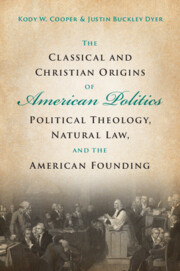 The Classical and Christian Origins of American Politics
The Classical and Christian Origins of American Politics Published online by Cambridge University Press: 22 December 2022
Prevailing scholarly interpretations cast James Wilson's Lectures on Law (1790–1791) at the College of Philadelphia as paradigmatic of the founding era’s allegedly rationalist, heterodox natural theology. Yet Wilson’s Lectures point in quite the opposite direction: to a vision of the founding era jurisprudence that was self-consciously rooted in a divinely created and rationally intelligible moral order that was both complemented and presupposed by Christian revelation. So understood, Wilson’s Lectures bring into focus the limitations of the common scholarly conventions and categories that contrast enlightenment and religion, reason and revelation, or Nature’s God and the God of Abraham. In Wilson’s Lectures, these are not “either/or” categories but are rather presented together in a synthesis that emerged from the long Christian engagement with the natural-law tradition.
To save this book to your Kindle, first ensure [email protected] is added to your Approved Personal Document E-mail List under your Personal Document Settings on the Manage Your Content and Devices page of your Amazon account. Then enter the ‘name’ part of your Kindle email address below. Find out more about saving to your Kindle.
Note you can select to save to either the @free.kindle.com or @kindle.com variations. ‘@free.kindle.com’ emails are free but can only be saved to your device when it is connected to wi-fi. ‘@kindle.com’ emails can be delivered even when you are not connected to wi-fi, but note that service fees apply.
Find out more about the Kindle Personal Document Service.
To save content items to your account, please confirm that you agree to abide by our usage policies. If this is the first time you use this feature, you will be asked to authorise Cambridge Core to connect with your account. Find out more about saving content to Dropbox.
To save content items to your account, please confirm that you agree to abide by our usage policies. If this is the first time you use this feature, you will be asked to authorise Cambridge Core to connect with your account. Find out more about saving content to Google Drive.